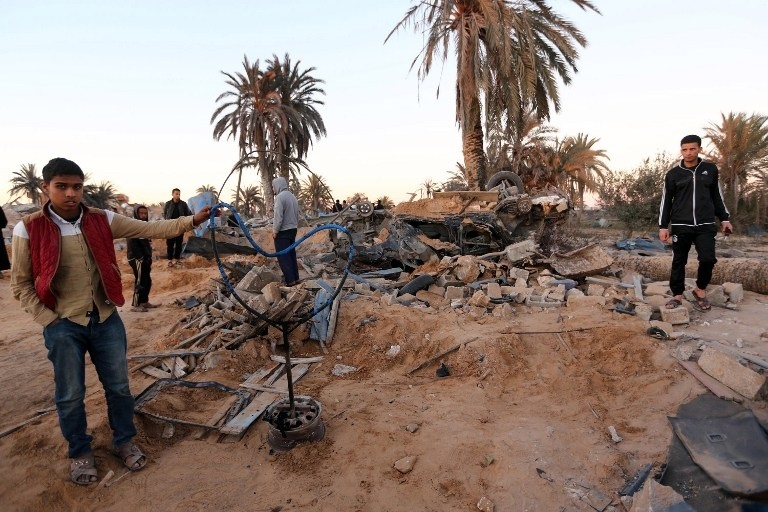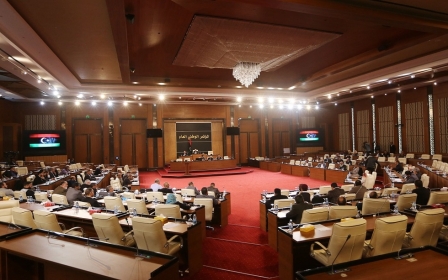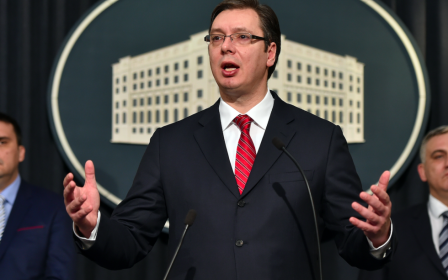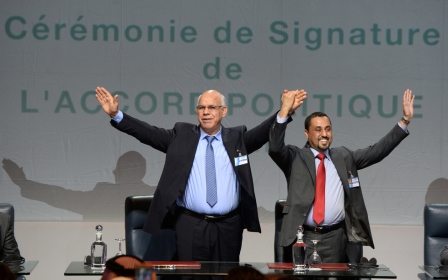Local IS chief captured in western Libya: Ministry

A local Islamic State (IS) group chief and two aides have been captured in a city near Libya's capital, according to the Tripoli-based authorities.
The Tripoli interior ministry's special forces unit, on its Facebook page, said the IS "emir" for Sabratha, Mohamed Saad al-Tajuri, also known as Abu Sleiman, was seized in the city 70 kilometres west of the capital.
It did not specify his nationality or those of his two aides.
On Wednesday, IS killed 18 people in clashes as they briefly occupied the heart of Sabratha before they were ousted by militia fighters, according to officials in Tripoli.
A US air strike near Sabratha last week targeted a suspected IS training camp, killing 50 people. Serbia said two of its diplomats - Serbian embassy communications chief Sladjana Stankovic and her driver, Jovica Stepic, who were abducted by IS near Sirte in mid-November - were among the dead.
US Secretary of State John Kerry offered his condolences to the Serbian prime minister over the deaths on Monday, despite the Pentagon initially saying there was "nothing to indicate" that the pair had been killed in the strike.
The Pentagon did say that a senior IS operative behind attacks in Tunisia was probably among the dead.
IS has taken advantage of growing chaos to expand its foothold in Libya, which has rival administrations vying for power.
The internationally recognised government fled Tripoli in mid-2014 after the Libya Dawn militia alliance overran the capital and set up its own parliament.
Last June, IS seized the coastal city of Sirte, east of Tripoli, raising fears that it is establishing a new stronghold on Europe's doorstep.
The group has since attacked key coastal oil facilities and staged a string of suicide bombings.
In recent days, forces loyal to the rival government in Tobruk managed to drive IS and other militants out of Libya's second city Benghazi after two years of trying, although militants were still holding on to the port.
All Libyan sides 'guilty of war crimes'
In a damning report issued on Tuesday, the UN accused all sides in Libya's chaotic conflict of committing probable war crimes, including torturing, raping and executing prisoners.
The UN also urged the world to do more to bring the perpetrators to justice.
"A multitude of actors, both state and non-state, are accused of very serious violations and abuses that may, in many cases, amount to war crimes," UN human rights chief Zeid Ra'ad al-Hussein said in a statement.
A report released on Thursday documenting abuses committed in Libya between 2014 and 2015 warned the situation had deteriorated dramatically during that period.
Thursday's report details how most major armed groups in the country "have carried out unlawful killings," mainly executing people they had taken captive and assassinating those seen as voicing dissent.
The six-member investigation team behind the report was only able to visit Libya briefly during their year-long probe due to the dire security situation. However, they conducted interviews with more than 200 victims and witnesses.
They described how bodies of people detained by different armed groups and the Libyan National Army were found bearing clear evidence of torture and execution.
The report also details widespread and horrific torture by different factions, including beatings with plastic pipes and electrical cables, prolonged suspension in stress positions, electrocution and lack of food. According to the report, a number of detainees had been tortured to death.
The report, which was ordered by the UN Human Rights Council, said thousands of people were currently in detention, most without any proper examination of their cases, and many in secret detention centres.
Sexual violence, while difficult to document, appears to be rife in places of detention, the investigators said.
They detailed one case where a woman said she had been abducted in Tripoli by members of an unidentified armed group, before being drugged and repeatedly raped over six months. After her escape, she discovered she was pregnant.
The woman said she had seen six girls as young as 11 who were sexually abused by members of the same group.
The investigators also decried the forcible recruitment of children by armed groups, including those linked to the Islamic State, who celebrated the practice.
Middle East Eye propose une couverture et une analyse indépendantes et incomparables du Moyen-Orient, de l’Afrique du Nord et d’autres régions du monde. Pour en savoir plus sur la reprise de ce contenu et les frais qui s’appliquent, veuillez remplir ce formulaire [en anglais]. Pour en savoir plus sur MEE, cliquez ici [en anglais].




